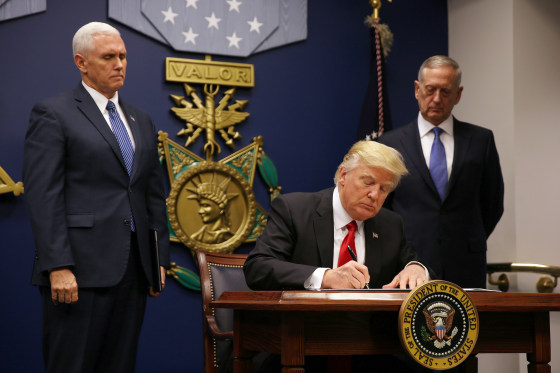WASHINGTON — A new White House memo seeks to keep parts of President Donald Trump's immigration executive order alive, even as its broader implementation remains stalled due to court injunctions.
The presidential memo, sent on Wednesday afternoon to the attorney general, the secretary of Homeland Security, and director of national intelligence, seeks to extend the viability of one of the travel ban's key pieces: the temporary suspension, for a period of 90 days, of immigration to the United States from six predominantly Muslim countries — Iran, Libya, Somalia, Sudan, Syria, and Yemen.
That 90-day period was about to expire, with some challengers of the ban — like Faiza Patel of the Brennan Center's Liberty and National Security Program — using the lapsing timetable to reason that the executive order was now "moot." By setting a new date for the ban’s implementation, the administration may be able to argue that it has not expired.
The memo also allows for the government to begin carrying out studies on the dependability of visa background check information from those six countries. The 9th U.S. Circuit Court lifted that narrow part of their stay on the executive order while maintaining other stays that prevent wider implementation.
"The State Department has already issued new visa vetting procedures with no ban in place," Patel countered. And with the 9th Circuit's ruling from Monday, it can start its worldwide review of visa issuance — again with no ban in place.
"Which leads to the obvious questions," she told NBC in an email. "Why did they need a ban and why are they still fighting for it?"
President Trump has promised to take the fight for the travel ban, one of his signature campaign promises, all the way to the Supreme Court. Earlier this month, the Department of Justice asked the Supreme Court to allow the "ban" to take effect, while also asking the court to fast-track the case.
“We have asked the Supreme Court to hear this important case and are confident that President Trump's executive order is well within his lawful authority to keep the nation safe and protect our communities from terrorism," Justice Department spokesperson Sarah Isgur Flores said at the time.
Since that request, the ban has been dealt additional legal blows.
On Monday, three judges on a panel of the 9th U.S. Circuit Court of Appeals unanimously upheld an earlier decision by a Hawaii federal judge to block the government from enforcing the travel executive order. The judicial trio argued that while the president does have "broad powers to control the entry of aliens, and to take actions to protect the American public," immigration "is not a one-person show" and, as a result, the president's authority is subject to restraints.
The White House has consistently argued that the travel ban is well within Trump's powers as president — with Trump himself defending the ban as a necessity in a time of chaos.
"We need to be smart, vigilant and tough. We need the courts to give us back our rights," he tweeted in the immediate aftermath of a terror attack in London. "We need the Travel Ban as an extra level of safety!"

